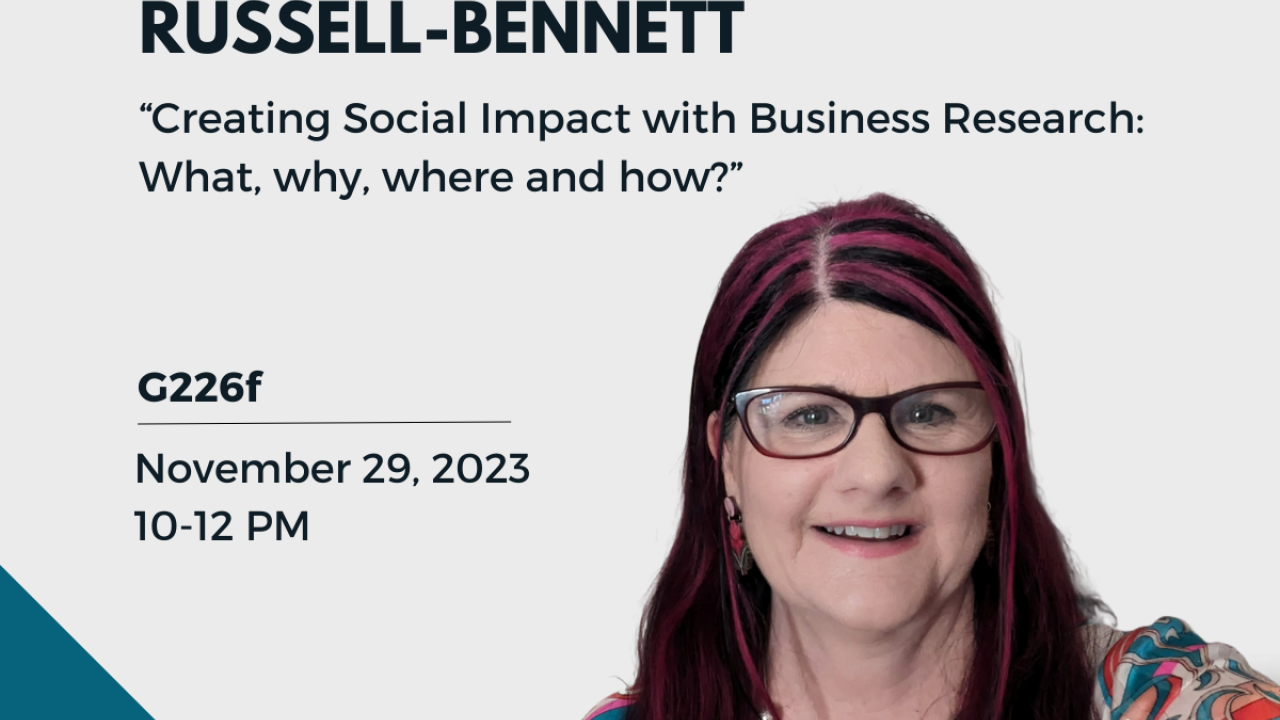Seminar with Professor Rebekah Russell-Bennett

Kindly mark your calendars for a seminar with Professor Rebekah Russell-Bennett. The hybrid seminar will take place on Thursday, November 29th, from 10:00 to 11:30 am in room G226f.
Creating Social Impact with Business Research: What, why, where and how?
There is a new dawn for universities globally if not a renaissance for academia called social impact. The realization that a core purpose of universities and academic research is to create positive change that addresses human problems and uplift humanity has been slow to emerge in social sciences such as business. For decades if not centuries, fields such as engineering, chemistry and medicine have prided themselves on the transfer of knowledge to the field resulting in patents and new discoveries that aid social impact. The world uses the vaccines, construction biomaterials and 3D printed body parts developed by researchers but what does the world use from business research? According to many commentators, not much. Discussion on the lack of social impact by business (social science) researchers typically places the blame on the reward and recognition systems at universities (people do what they are rewarded to do). With a traditional focus on publications in high-ranked journals as the end of the research process, universities have unintentionally created a disincentive for business research that is designed first and foremost to create social impact. Business tenure and recruitment committees have placed greater emphasis on journal rankings and citations than on the social, economic or environmental benefits of the research.
However, the sun is now shining on social impact with the funding sources of public universities (governments) demanding more social impact. Given that public good is the key competitive advantage of universities in comparison to commercial competitors, ensuring that the public benefits more directly from research is also a smart survival strategy.
This presentation will outline what social impact in business research looks like (and what it is not), and why it is important. The presentation will then use interactive activities for participants to identify how to generate ideas for social impact research and outline tips for balancing academic and social impact.
Bio: Professor Rebekah Russell-Bennett, Director Centre for Behavioural Economics, Society and Technology, QUT, Australia/Visting Professor Maastricht University
Rebekah is a professor in marketing and director of the Centre for Behavioural Economics, Society and Technology (BEST) with a specific interest in customer vulnerability. Rebekah is the inaugural SERVSIG officer for social impact and has an international reputation for industry-relevant research in the fields of Transformative Service Research and Social Marketing (using commercial marketing to address social problems such as alcohol consumption, chronic disease, water usage, electricity use, public transport and diet). Rebekah uses theories and frameworks from services marketing and social marketing to co-create innovative services and products that support people in their life, protect the planet and enable organisational success. Rebekah is the #1 TSR academic in Australia and ranked #5 globally (Scival). She has attracted more than $20m in funding from the Australian Research Council (ARC), industry and government organisations which is evidence of the high impact of her research.
To learn more about Rebekah Russell-Bennett, please follow this link: https://research.qut.edu.au/best/staff/rebekah-russell-bennett/ Opens in new window

